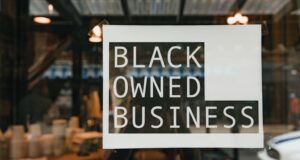Black America is a diverse group of people with many different backgrounds and lifestyles. However, one thing that all black Americans have in common is that they are disproportionately impacted by economic inequality.
There are currently an estimated 42 black owned banks in America. Black owned banks play an essential role in financing and promoting economic growth. Additionally, they provide banking services to low- and moderate-income individuals and businesses that might not have access to traditional banking institutions.

Over the past few years, there has been a growing interest in understanding how black Americans are faring economically and addressing these disparities.
Why Are Black-Owned Banks Important?
Black-owned banks are essential because they provide financial services to black communities often overlooked or underserved. They play a vital role in developing businesses and the economy by providing access to credit and other financial services that are not available to many people.
Black-owned banks also promote diversity and inclusion by creating opportunities for people from all backgrounds to participate in the financial sector.
Black-owned banks play a significant role in economic development by supporting businesses of all sizes and helping to create jobs. They also provide essential services to low-income and minority populations, who often do not have access to other financial products and services.
In addition, black-owned banks help build community wealth, which can be beneficial for generations to come.
The Top 10 Specialties You Should Know About Black Owned Banks in America
The digit of black-owned banks in America has increased as the financial industry becomes more diverse. Many people are oblivious to the significance of black-owned banks. And did you know that more than half of the banks founded by African Americans in the U.S. are still operating today?
So, what are the benefits of banking with a black owned bank? Here are the top ten reasons why you should consider banking with a black owned bank:
- Most black-owned banks are members of the National Bankers Association, the nation’s oldest trade association for the financial services industry.
- Nearly 60 percent of the country’s black owned banks are family-owned businesses.
- Almost 50 percent of all African American owned banks are community based organizations, providing much needed financial services to their community.
- More than 90 percent of all banks in America have a lending focus on communities of color.
- Over half of all the deposits at black owned banks are held by African Americans.
- African American owned banks are the number one source of credit to African American owned businesses.
- African American owned banks provide almost half of all the credit to African American owned firms.
- Over one hundred thousand new jobs have been created in the community since 2008, when black banks created more than $40 billion in loans.
- The average black owned bank employee is an African American. In contrast, the average white owned bank employee is a white male.
- A black owned bank was found to be better for a black business’ survival than white owned banks!
Why Are There Fewer Black-Owned Banks?
There are a few explanations for the low number of black owned banks, and let’s understand them one by one.
1) Lack of awareness: There is a lack of awareness among the people to establish their banks. If you don’t know how the banking system works, you might end up creating a loss. Moreover, when you fail to create a business, you will lose a lot of time and effort.
2) Systemic racism and widespread racist practices: There are many reasons why black-owned banks are rare, but one of the essential factors is systemic racism and widespread racist practices. This includes banks discriminating against black borrowers, denying them loans, and charging higher interest rates.
Additionally, black businesses are less likely to be approved for loans and credit. They are also more likely to experience discrimination when trying to get a loan.
These factors are often compounded by the fact that black Americans are more likely to be lower-income, have lower education levels, and live in neighborhoods with higher crime rates. This results in black Americans being less likely to have assets that can be used as collateral for a loan.
As a result, black-owned banks are few and far between because they are not able to compete in the traditional banking system.
3) Financial literacy: The economic literacy of the people is very poor. It is common knowledge that more than 90% of the people don’t know how to earn money on their own.
They don’t know how to invest in their finances. When they try to start a business, they fail because of the lack of money, and when they face a financial problem, they don’t know what to do. Therefore, it is better to invest in a bank where you will get the best services.
4) Less capital: It has been seen that only a small percentage of people can afford the high-interest loans offered by commercial banks. This is one of the ultimate causes why black owned banks don’t exist.
There is a large number of less affluent people. They can’t save their money because the interest rates are higher than the average. Therefore, many wealthy people can start their businesses and set up a bank.
5) Access to finance: The majority of the people in the world cannot start a bank due to the high costs. The increased amount of funds required is one of the reasons for this.
It costs a lot of money to build a bank. It takes a huge amount of capital, and the initial cost is too high to be affordable. If the people in the world could raise money, the world would be a better place.
In Africa, there are a large number of microfinance banks. If there were many such banks, many people would be able to start their businesses.
Final Word
It is evident that there are a limited number of black-owned banks in America. While this is unfortunate, some things can be done to support these businesses. One method to do this is patronizing these banks and spreading the word about their existence. By doing this, we can help ensure the longevity of these businesses and further empower the black community.



